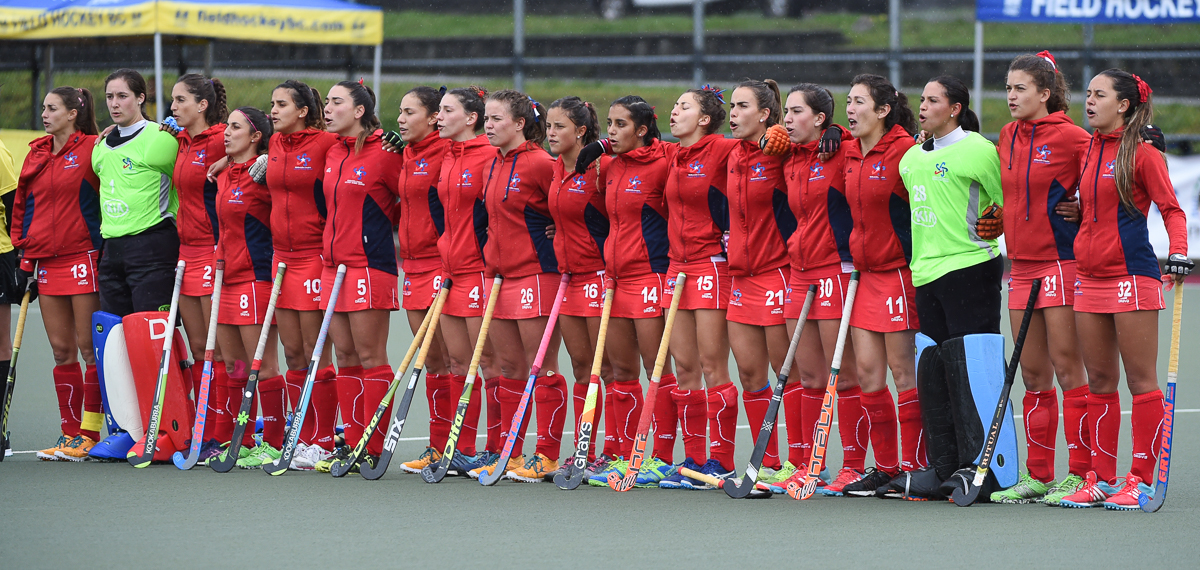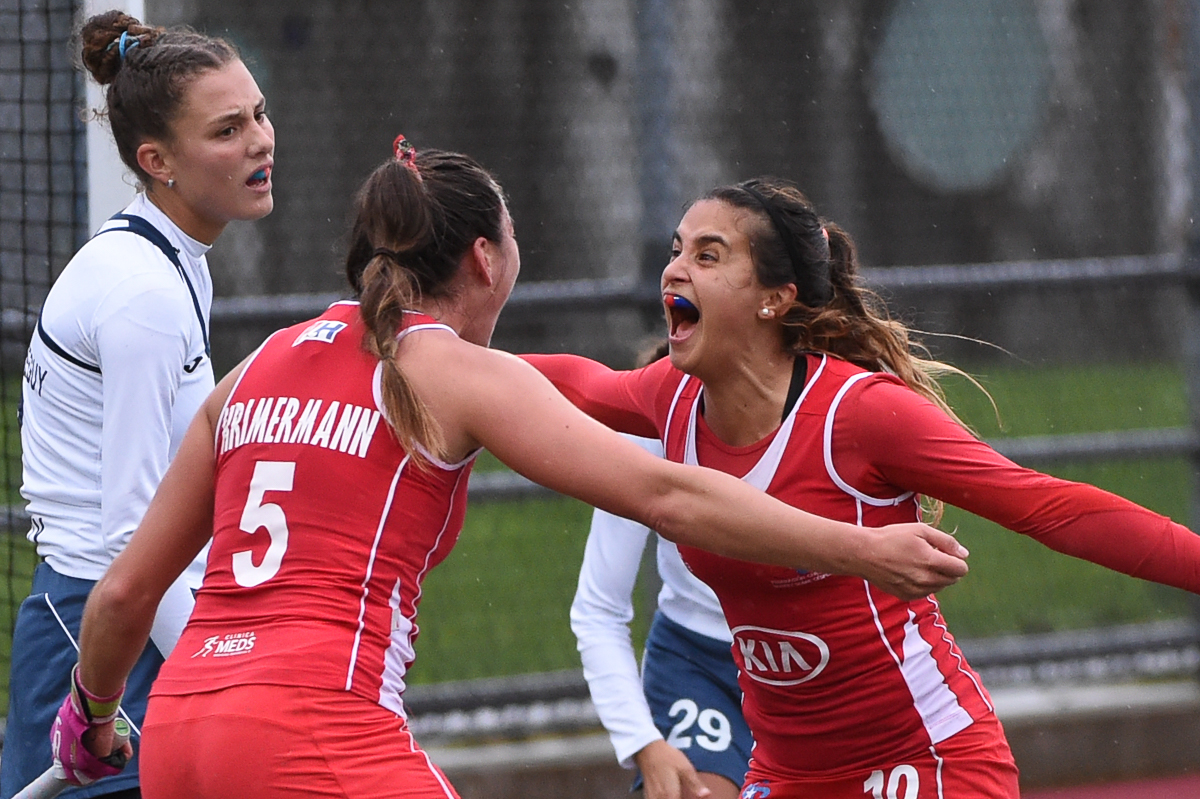
Argentina men and women and the USA women’s side will be viewing the upcoming HWL Semi-Finals as the golden opportunity to seal qualification for the 2018 World Cups, and it would be a foolish person to bet against all three teams qualifying. However, two other teams from the region also have their own World Cup dreams and we meet two players and a coach who are now hoping that their own journeys will culminate in London or Bhubaneswar next year.
While the HWL Round Two events are all done and dusted, for a number of teams the hard work is not just continuing, it is getting tougher. For those teams that qualified for the next stage – HWL Semi-Finals – the prize is tremendous: a potential spot at the 2018 Hockey World Cup, a place in the HWL Finals in December, as well as a march up the world rankings.
Five PAHF teams are now in preparation stages for the Semi-Finals. Teams ranked in the top 11 in the world, including Argentina men and women and USA women, automatically qualified for the next set of HWL events, and they will be joined this year by Canada men and Chile women, who both qualified via HWLR2, in Trinidad and Tobago and Canada respectively.
Argentina and Canada men’s teams will be heading off to compete in London, England, from 15-25 June, while Argentina, USA and Chile women will all be battling for a top three finish in the heat of Johannesburg, South Africa. This competition runs from 8-23 July. The other venue for the HWL Semi-Finals, at which there are no PAHF teams competing, is Brussels, Belgium.
Chile women were the surprise package in the HWL R2 event held recently in West Vancouver. They entered the tournament ranked 20th in the world and beat the higher ranked host nation Canada in a tense 1-0 match as well as close rivals from South America, Uruguay, who held their own aspirations to repeat their 2015 HWL Semi-Final adventure. Chile eventually lost to the top ranked team India, but only after a 1-1 draw in the final: the match was then decided on penalty shoot-out.
Manuela Urroz has been a key member of the Chile national squad since she first pulled on the shirt of the Diablos eight years ago. She plays her club hockey in Belgium but one of her ambitions is to make hockey the number one sport in Chile.
Looking back on the HWL R2 event in Canada, Urroz says: “I think the tournament was great for us. We won against teams that are not easy to beat like Canada and Uruguay and we drew in the final against India, who had played at the 2016 Olympics. We worked hard as a team, defending our own circle really well and scoring goals in every game.”
Team Captain Camila Caram says the next few months will be intense for the Chile team. The coaching staff have identified areas that need improvement based on those performances in Canada and, with the entire squad living in or around Santiago, training has really ramped up. “Everyday we train a minimum one shift, some days two. As we have only two months, we won’t be getting much in the way of international matches. Maybe one small tour to Argentina, as we are lucky to have them as neighbours.”
Like many nations who are ranked outside the top 10 teams, Chile’s players are mostly amateur, with jobs or studies jostling for a proportion of their time. Urroz has been playing her domestic hockey in Belgium, where she is looked after as a professional athlete, but for some of the players it is a difficult balance between studies, work and hockey. As Urroz says, when it comes to tournaments, such as the HWL Semi-Finals, this puts an even bigger strain on a player’s life. The team leaves for South Africa 10 days ahead of the tournament starting and then they have a further 10 days of intense competition before returning to Chile. That adds up to more than three weeks of time spent travelling and living out of hotel rooms.
“We can travel for many weeks when there is a tournament,” says Urroz. “And everyone has to arrange their lives around that. But, even though it can be hard, we are a committed bunch and that doesn’t detract the focus of the team from our long-term objectives.”
The fact that many of the Chile team now play for clubs in other countries has been a big help in the development of the nation’s hockey. Learning how to play with and against other styles of play is something that can only be gained by experience, and with several of the players now plying their hockey trade in Europe, the knowledge is filtering through the squad.
The beauty of the Hockey World League is that the teams get the chance to play national squads that they do not meet on a regular basis. The HWLR2 final against India will have been one of the few occasions that the Chile players have faced an Asian team, but that experience will stand them in good stead when they face Japan and India again in South Africa. Among their other opponents are England, who as Great Britain are reigning Olympic champions, plus the Olympic bronze medalists Germany. The presence of PAHF rivals USA and Argentina will also pose a challenge to Chile – these are teams they know well and will be very aware that they haven’t beaten either side in a major tournament.
Urroz puts its very simply: “Our major challenge in South Africa will be qualify to the World Cup. But for that we need to beat teams that are higher ranked than us. To reach our objective we need to be the surprise of the tournament. I believe we are capable of that if we keep fighting hard as a team and trusting in our working process.”
Caram agrees: “We are the lowest ranked team in the tournament. So every team on paper, are on top of us. To not think about that, and play against this higher ranked team, as equals, will be quite a challenge. We need to concentrate on not being in the bottom of the pool.
“But we played against India in HWLR2 and it was a really tight game, where they just beat us in shoot outs. And we played against South Africa in the summer, and they were also tight games. So we are hoping to create several upsets. Argentina and the USA, we know them pretty well, we've played against them many times. It will be a little bit harder against them, but we stay positive and we stay together as a team in good and bad moments.”
One team that is getting used to competing in the big leagues is Canada men. The team achieved a fourth place finish in the 2015 HWL Semi-Finals, effectively booking their berth to Rio 2016 in the process. They also qualified for the HWL Finals where, they would concede, they encountered a huge learning curve – finishing in last place after losing all their matches.
Head coach Anthony Farry is determined that the past two season’s experiences will provide a platform for his team to move forwards. Playing the top ranked teams, even if they have lost the games, has provided the Canadian players with a wealth of experience and, as Farry points out, at the HWL Semi-Finals last time around, the team knows they can perform well when it counts.
Farry is a coach with a clear strategy that his players have all bought into. Players and coach talk about “continuing to build on our core concepts/principle in training so we try to make sure we are good at what we do.”
The Canadian team’s preparation will be tough and focused. “Training, training and more training,” says Farry. The team is travelling to Europe early to get a few practice matches against France – something that will get the travel out of their legs and acclimatise them for a European summer.
With so many players now joining clubs across the globe, there is an increasing homogenisation of styles. Many of the Canadian players have competed in Europe or Asia. Farry says that among the teams of similar rankings, there is not a great difference in the way the game is played. His aim is to get his players performing with the consistency and level of ball control that the very top teams display.
Canada went to the 2015 HWL Semi-Finals as the sixth ranked nation and came away with a fourth place finish. This year, they are the fifth ranked team, and to qualify for the World Cup they need to repeat that feat of finishing two places higher than their ranking. Farry knows that his team must be at their best to get the result they desire but he also knows that his team have a knack of delivering when it matters most.
In London, Canada will be joined by the world number one side, Argentina. The last time Argentina competed in a major competition in London was the 2012 Olympic Games, where they finished a disappointing 10th, one place lower than their world ranking at the time. This is a very different team, with a very mindset and Carlos Retegui and his side will be determined to show the world that they are the number one ranked team for a reason.
PAHF might have only two representatives among the 20 teams competing in the men’s two HWL Semi-Final events, but this might be a case of quality outplays quantity.

